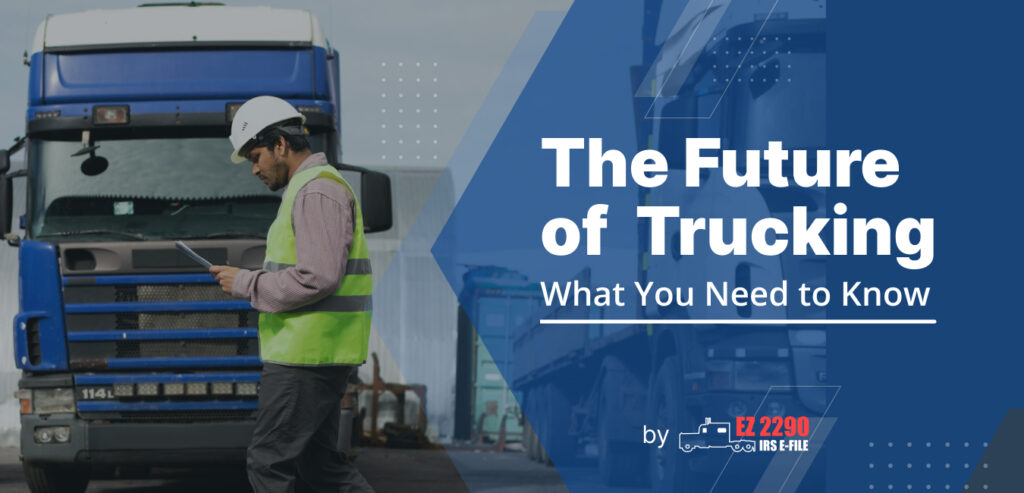
Revolutionizing the Road: Embark on a thrilling journey into the future of trucking! Discover how Independent Truckers can navigate the ever-evolving landscape, from cutting-edge technology and eco-friendly practices to the rise of the gig economy. Uncover the key insights you need to stay ahead and embrace the exciting opportunities in this transformative era of transportation.

The trucking industry stands at a crossroads in a world of constant change and innovation. Independent Truckers, the unsung transportation heroes, face many challenges that threaten their livelihoods and the efficiency of the goods delivery.
The road ahead seems uncertain, from rising fuel costs and driver shortages to the ever-increasing pressure for sustainable practices. But fear not! Our blog, “The Future of Trucking: What You Need to Know,” is here to steer you through this tumultuous terrain.
Join us as we delve into the cutting-edge technologies, emerging trends, and strategic solutions that will equip Independent Truckers for a prosperous journey.
Understanding The Current State of Trucking And the Challenges Associated
The trucking industry serves as the lifeblood of economies, ensuring the seamless movement of goods across vast distances. As the backbone of supply chains, it is pivotal in delivering products to our doorsteps and shelves.
However, the landscape of trucking is far from static. It is characterized by a whirlwind of changes, innovations, and challenges that demand adaptation and resilience from those who navigate its highways.
Challenges Faced by Independent Truckers
Rising fuel costs and operational expenses
In recent years, the volatile nature of fuel prices has been a constant concern for Independent Truckers. Fluctuating oil prices impact their profitability and the overall cost of goods transportation, rippling through various industries. Additionally, the burden of operational expenses, including maintenance, insurance, and tolls, weighs heavily on the shoulders of independent operators, calling for innovative cost-saving strategies.
Driver shortages and an aging workforce
As seasoned drivers approach retirement age, the trucking industry faces a talent attraction and retention crisis. The allure of long hours on the road and strenuous physical demands deters many from pursuing a career in trucking. This alarming trend of driver shortages puts pressure on existing Independent Truckers and hampers the industry’s capacity to meet the growing demands of global trade.
Emphasizing the need for technology adoption
The digital era has ushered in a wave of technological advancements that promise to revolutionize the trucking landscape. Embracing these innovations is crucial for Independent Truckers to stay competitive and relevant. From telematics and GPS tracking to autonomous driving and smart logistics, technology holds the potential to optimize routes, enhance safety, and streamline operations.
However, the hesitation and resistance to adopting new tech may leave some Independent Truckers disadvantaged in this ever-evolving industry.
Technological Innovations in Trucking
Emerging Technologies in Trucking
The trucking industry is on the cusp of a technological revolution that promises to redefine how goods are transported globally. From advanced telematics and route optimization software to blockchain-based supply chain solutions, many cutting-edge technologies are reshaping the future of trucking. Embracing these innovations will be pivotal for Independent Truckers to enhance efficiency, reduce costs, and unlock new growth opportunities.
The potential of automation and self-driving trucks
Automation has emerged as a game-changer in the world of trucking. Self-driving trucks promise increased safety, reduced human error, and extended driving hours, which can significantly impact the trucking industry.
As autonomous vehicle technology evolves, Independent Truckers must adapt to this paradigm shift by understanding the implications and exploring how they can integrate with or leverage these advancements in their operations.
Advantages and challenges of AI and IoT in trucks
Artificial Intelligence (AI) and the Internet of Things (IoT) are reshaping trucking operations profoundly. AI-driven analytics can optimize routes, predict maintenance needs, and enhance fuel efficiency. IoT sensors facilitate real-time tracking and monitoring of cargo and vehicle conditions.
While these technologies offer numerous benefits, Independent Truckers must also navigate potential challenges such as data security, privacy concerns, and the initial investment required to implement these solutions.
Environmental Sustainability
Growing concern for the environment in the trucking industry
Amidst growing awareness of climate change, the trucking industry faces increasing pressure to address its environmental impact. Independent Truckers play a pivotal role in this endeavor, and their actions can significantly positively affect reducing carbon emissions and promoting sustainability.
Transition to electric and alternative fuel-powered trucks
Embracing electric and alternative fuel-powered trucks represents a crucial step toward a greener future. Independent Truckers can lead the charge by adopting eco-friendly vehicles that reduce emissions and offer long-term cost savings through reduced fuel consumption.
Sustainable Practices for Independent Truckers
Implementing sustainable practices, such as efficient route planning, load optimization, and idle reduction, can make a substantial difference in minimizing the environmental footprint of trucking operations. By prioritizing sustainability, Independent Truckers can contribute to preserving the planet for future generations while gaining a competitive edge in an increasingly eco-conscious market.
How Can Independent Truckers Embrace Technology to Stay Competitive?
To remain competitive in a rapidly evolving industry, Independent Truckers must become tech-savvy and proactive in adopting these transformative technologies. Staying informed about the latest advancements, attending industry conferences, and collaborating with technology providers are essential.
Moreover, investing in training and upskilling to operate and leverage tech-enabled systems effectively can empower Independent Truckers to optimize their performance, streamline operations, and provide superior customer service.
Conclusion
The future of trucking holds exciting possibilities for Independent Truckers. Embracing cutting-edge technologies like automation and AI will enhance efficiency and safety. Transitioning to eco-friendly vehicles will reduce emissions and cut costs. By prioritizing sustainability and staying tech-savvy, Independent Truckers can drive towards a successful and eco-conscious future. Let’s revolutionize the industry together!
Useful Resources on Truck Tax Form 2290:




